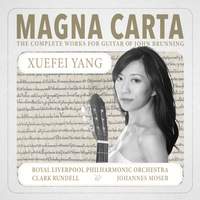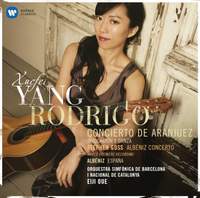Interview,
Guitar works by John Brunning
 Widely-known to audiences around the world in his capacity as a long-serving presenter on Classic FM, John Brunning also enjoys a career as a composer both for his own main instrument, the guitar, and for other forces.
Widely-known to audiences around the world in his capacity as a long-serving presenter on Classic FM, John Brunning also enjoys a career as a composer both for his own main instrument, the guitar, and for other forces.
Combined with his longstanding friendship with guitarist Xuefei Yang, all the ingredients were in place for a recording that would draw together Brunning's guitar compositions – which duly materialised in May this year, centred around the Magna Carta concerto.
I spoke to John and Xuefei about how this album came about, and the origins and development of the music recorded on it.
How long have you known each other – have you collaborated on other projects in the past?
Xuefei Yang: The first time John and I met was for an interview - he was interviewing me for Classic FM Magazine in a Chinese restaurant in London. I think it was in 2007? I remember John asking some very expert questions - I was quite surprised, and then I learned that he was a guitarist himself and then it made sense! Over the years I recorded some of his pieces, for EMI and others. It's not exactly a collaboration, but I've been playing his works both in recordings and in concerts, and audiences always like them. And many years ago John showed me the concerto.
John Brunning: Well, in its infancy! As I remember, you and I met on the stairs at the Cheltenham Festival - you were coming down and I was going up! It was the year that Alison Balsom was the music director, so I think that was three or four years ago. I was late, as usual, and I greeted Xuefei and said I had some things we needed to discuss - and then after about 45 seconds (I was due on air!) I bolted off up the stairs. So we were reunited at that moment, and I decided that if Fei was up for it it would be really nice to get the concerto "over the line", so to speak.
So is that where this album was first conceived - in a chance re-encounter?
JB: Well, we'd been in touch, but it was that meeting that really decided it, I think: If we were going to do this, we'd need to get on with it.
And was it initially going to be just the concerto, with the expansion into your complete works (so far, as you've been keen to emphasise) coming later?
JB: Yes, it grew from there. I wasn't happy with that description of it as my "complete guitar works" - it sounded far too final! Definitely more to come. The project grew out of the fact that we had some music there with the concerto and some other pieces as well; I think it was actually Fei's idea to do either five Bagatelles or five Romances, so we settled on the latter and the extra piece with the cello. Really the driving force for that was that we wanted sufficient material for a physical CD.
XY: As a guitarist, we're always very appreciative of repertoire for guitar and orchestra. And an English concerto - I can't immediately think of very few concertos for guitar written by English composers. So with this concerto at the core - a new piece for guitar written by an English composer, together with the Romances for guitar and strings - I thought it would be a very nice album. New additions to the repertoire - I'm always passionate about exploring new repertoire for the guitar, especially for guitar and orchestra. That's very lacking. But even for guitar and cello - there's not much for that combination.
Some of the Romances included here were originally for other forces; was this recording what prompted you to arrange them into a set for guitar, or did they already exist in that format?
JB: The guitar has always been my instrument; everything I've done and do originates there. I compose at the guitar, not at the piano - one of my great regrets in life is that I never took piano studies seriously! People have said to me that that does give the music that I compose a distinctive edge - since most people do use a keyboard to compose. So I think it does have certain advantages that perhaps I've only ever seen as disadvantages! But you're right - several of these pieces were originally written as vocal music, because choral music is another love of mine. I don't have any training in it, but I'm very fond of it and I like writing voices.
XY: I can clearly feel that vocal quality in John's pieces; in fact there are two things that I can feel about his music based on the fact that he is a guitarist. One is that his pieces are very playable on the guitar because he knows how it works. I play lots of new pieces by other composers; a lot of the time they don't know the guitar, they don't play it themselves.
So you can tell they're written by a guitarist from how well they sit under the fingers?
XY: Yes - that's one characteristic. The other is the one John just mentioned, the vocal quality. The melody is the main attraction for me; they're always so beautiful. Sometimes, in contemporary music, I find myself thinking that although the composer may have focused on lots of different things, I want a melody! So that's why I very much enjoy playing John's pieces; it gives me a chance to sing on my guitar.
JB: We're very much on the same page there. For me, music and melody are, if not completely indivisible, then at least go together very naturally. I can't imagine writing - and I don't think I'd know how - something that wasn't strong melodically.
Did you plan the concerto from the beginning to be a musical response to the anniversary of the Magna Carta? Is there any kind of programme behind the music relating to that historical connection?
JB: No - as Fei has already alluded to, there aren't very many British guitar concertos but it is still just a guitar concerto. We thought it would be nice to have a more catchy name but it's not about anything. We ran a competition among Classic FM listeners to come up with a name for it - because the work was finished around the 800th anniversary of the signing of the Magna Carta - and we had some interesting responses! The "Concerto Magna Carta" was suggested, and it plays into the Englishness of the whole project, so I thought that was just perfect.
Earlier in your career you played in a number of rock bands – but who would you say were the main influences on the classical style you now write in?
JB: I've never put music into compartments; I like so many things and my tastes are so broad. I started buying classical records when I was 8 so I've lived with it my whole life. People sometimes ask me whether I listened to classical music before Classic FM! And I always find that vaguely offensive. It's been a lifelong thing for me. It's a hard question to answer because my tastes are just so eclectic. I don't think those two distinct mindsets - classical vs not - exist, for me.
Where did the idea first come from to add this cadenza to the concerto, using a selection of traditional melodies from the British Isles?
XY: At first, when John showed me the concerto and asked me to write a cadenza, I was at a loss for how I could do it. If you remember from my Sketches of China album that we talked about a few years ago, the opening piece, A Lovely Rose - that composer also asked me to contribute a cadenza at the beginning, so I did; it's about two minutes, but in live concerts I extended it and it went down well with audiences. So that gave me some confidence - I knew I could do it.
But for the Magna Carta concerto I didn't really know where to start; then I thought that since it's such an English work I could incorporate something relating to that theme. I actually wrote it during my fourteen days' quarantine after I arrived in China in 2020, and I was confined to my room for that time - so I forced myself to work it out!
Having lived in the UK for twenty years (even though I still have my Chinese passport and citizenship), over the last few years I feel the country has been very fragmented through Brexit and other things. People have become very divided. But in my eyes, and I think in a lot of other foreigners' eyes, the UK is one country; in Chinese "English" and "British" are the same word, we don't make a distinction. I thought about how much I'd enjoyed playing British folk songs - Irish, Scottish, English - so wondered about just using elements from each country of the UK, alongside some material from each movement of the piece, and put them together.
The other inspiration comes from another concerto, which had been written for me by Stephen Goss and which I recorded for EMI alongside the Rodrigo Concierto de Aranjuez. He used the material from each movement - based on different pieces by Albéniz - as a cadenza as a standalone movement. When I was recording and performing that, it occurred to me that playing a substantial cadenza as a separate movement worked quite well. So, I chose some elements from the four different nations of the UK and also some material from John's movements and made them into a standalone piece.
This also had the advantage that I didn't have to work out my own melodies! They were already there, and I simply had to mix them together. Everyone who listens to the Magna Carta concerto feels like they relate to the music, which was the idea.
There's one extra-special thing - I found that the English folksong Sumer is icumen in is from the same period as the creation of the Magna Carta - mid-13th century. So I suppose that has a connection to the concerto. And thus today's listeners can hear some music from that period - that's the idea.
Was the cadenza initially improvised, or did you write it out beforehand?
XY: Oh, I wrote it out! I had to. I really admire the skill of improvisation; I'd like to be able to do this but I'm trained in classical playing. So I worked the cadenza out in advance. Sumer is icumen in is a very old song but I modernised it a bit with different harmonies.
JB: I love the way that at various points in the cadenza it refers back to the three movements of the concerto; it's so beautifully integrated.
XY: Yes - it has to connect to the concerto itself, otherwise it loses its point.
Xuefei Yang (guitar), Johannes Moser, Royal Liverpool Philharmonic Orchestra
Available Formats: CD, MP3, FLAC, Hi-Res FLAC
Xuefei Yang (guitar), Weiliang Zhang (xiao), Sha Yuan (guzheng), Xiamen Philharmonic Orchestra, Renchang Fu
Available Formats: MP3, FLAC, Hi-Res FLAC
Xuefei Yang (guitar), Orquestra Simfonica de Barcelona, Eiji Oue
Available Formats: Presto CD, MP3, FLAC





